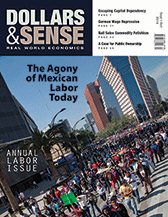What’s Next for Greece?
This article is from Dollars & Sense: Real World Economics, available at http://www.dollarsandsense.org

This article is from the
September/October 2015 issue.
Subscribe Now
at a 30% discount.

Credit: Fee Plumley, Creative Commons Attribution license 2.0.
Most readers already probably know the sequence of events between Greece and its creditors over the last month: a fruitless and frustrating negotiation; a take-it-or-leave-it offer from the creditors; the announcement of a referendum (the first in more than 40 years) for the people of Greece to decide whether to accept the offer; a triumph of the “No” vote (61.3% rejecting the offer, despite a visceral campaign in favor of the “Yes” by the Greek media and foreign politicians); the resignation of Finance Minister Yanis Varoufakis; a retreat by the governing Syriza coalition offering austerity in exchange for a deal; the creditors’ outrageous demands in an open attempt to push Greece or Syriza towards exit from the euro (€); a harsh deal that neither the Greek government nor its European partners believe in; the ratification of the ensuing economic adjustment program by the Greek parliament despite almost one-fourth of Syriza MPs voting against, abstaining, or absent, rendering Syriza effectively a minority government; the government’s resignation, and triggering a snap election in the fall; finally, the creation of a leftist anti-euro political formation (Popular Unity) by Syriza dissenters who claim adherence to the principles Syriza upheld before its rise to power.
The terms of the agreement between Greece and its lenders reflect the creditors’ attempt to make Syriza renege on all its promises and cross all its “red lines,” except for the promise to maintain eurozone membership. Sharp value-added tax (VAT) increases, the establishment of a privatization fund including €50 billion worth of assets, no restoration of collective bargaining rights or minimum wages, vetting of all legislation by the Troika (European Commission, European Central Bank, and IMF), and the “depoliticization” of Greek public administration, extending the model of the “independent” central bank to other aspects of government. How could Syriza have agreed to such a deal? Wouldn’t Greece be better off introducing its own currency, rather than conceding both fiscal and monetary policy sovereignty?
Leave the Euro but Stay in the EU?
Technically, all EU countries are required to aim towards eurozone membership, aside from the UK and Denmark, which have received exception clauses in the relevant EU treaties. Greece does not currently have such an exception—which also explains why an EU-28 summit was originally called for mid-July, before being canceled at the last minute, i.e., to accommodate a potential “temporary” Greek exit from the eurozone within the European Union.
However, it is important to note that the Greek media and European politicians were suggesting that a voluntary eurozone exit would also necessitate an exit from the EU. This was a powerful fear for Greece, and the fact that negotiations between rather hostile partners take place in uncharted water makes that fear hard to contradict.
In order to answer this question, one has to understand the political identity of Syriza. Syriza has historically been a “Europeanist” party—differing from the Communist Party of Greece in its adherence to the notion that it is possible to change existing European institutions. Synaspismos, the predecessor of Syriza, even voted in favor of the Maastricht Treaty that laid the foundations of the European Union and the eurozone in 1992, viewing the treaty as a first—albeit incomplete—step towards a more solidaristic and unified Europe. Most of the Syriza MPs, even to this date, believe that Europe, rather the nation-state, is the locus on which to improve conditions for workers and achieve positive social change. The rise of Syriza also came with support from “Eurosceptic” leftists, as well as increasing disillusionment of some Syriza factions with European Union and Eurozone institutions. However, for the Syriza leadership, the goal was not to exit the European Union, but to change it in favor of working people. Furthermore, Syriza never suggested that its goal was to abandon the euro: the closest the Syriza leadership ever came to proposing eurozone exit was Prime Minister Alexis Tsipras’ saying in 2012 that “the euro is not a fetish.” In 2015, such ambivalences were abandoned.
After the electoral victory of 2015, Syriza’s strategy focused on showing that the magnitude of the crisis was not Greece’s own doing, but a direct outcome of the eurozone’s flawed architecture and the catastrophic austerity policies imposed by the Troika. Exiting the euro would let the EU off the hook for its mistakes. However, both Syriza finance ministers, Yanis Varoufakis and now Euclid Tsakalotos, have openly stated that they were surprised at the lack of European willingness to engage in a substantive debate about the crisis and the remedies: Other finance ministers even chastised Varoufakis for “lecturing macroeconomics” to them. Despite making little headway with its European “partners,” Syriza never chose to exit the European terrain.
Herein lies the weakness of the strategy: a weakness of political imagination. Syriza never opened a public discussion about the euro in Greece. How does the euro help or detract from the project of productive reconstruction that Syriza promised the Greek electorate? Is the euro a tool for workers or for financial capital? What would happen to Greek citizens’ deposits and debts if Greece were to leave the euro? Would there be shortages of fuel, medicine, or food if Greece were to return to a national currency? The Greek oligarch-controlled media, which are now celebrating the agreement and praising “Tsipras, the statesman,” set the political terrain domestically by equating the euro with progress and a return to the drachma with catastrophe. The Greek collective imagination still clings to the euro as something beyond dispute, and significant parts of the left hold the same position. When—especially after the announcement of the referendum—the Greek media, the Greek opposition, and European politicians equated Syriza’s support of the “No” vote with the return to a national currency, Syriza attempted to close down the discussion, essentially embracing the discourse of catastrophe associated with leaving the euro. Even after signing the deal on July 13, Tsipras has said that Greece was not in a position to leave the euro without foreign reserves, while Varoufakis equated leaving the euro to becoming “North Korea.” Could the Greek government have chosen to leave the euro at that time? Realistically, the answer is no. Despite what various critics may claim, a significant part of Greek voters would have been unprepared for it.
However, no one can claim ignorance any longer. By following a consistent pro-Europe agenda, Syriza managed to point out the inconsistencies of the European currency union and its “democratic deficit.” When even Ben Bernanke, the former chairman of the Fed, comes out in support of the Greek position and the IMF categorically rejects the viability of the Greek debt without debt relief, it is bizarre to call Syriza a “radical” or “extreme” left-wing party. One has to look elsewhere for zealots. Now, Greece needs to take actions to stake out a stronger bargaining position in future negotiations. Given that the deal with the partners is not complete yet, and that Berlin politicians and their satellites will do their best to prevent any debt relief and stop the deal from materializing, it is time for a leftist government to take actions that will both undermine the effects of the neoliberal policies imposed on Greece and allow Greece to be better prepared for the next round of negotiations.
What does Syriza need to do in the very short-run, assuming that it maintains power after the fall elections? The Greek government, first of all, needs to (finally) attack the Greek oligarchy and tackle the web of intertwining relations between the media, banks, and other big business in Greece. Over the last five years, the Greek public has been taking out loans to recapitalize the Greek banks in exchange for preferred (nonvoting) stock: thus, the management of Greek banks has stayed in private hands. While lending had generally come to a standstill, the banks continued to make loans to insolvent private media, owned by a small number of Greek families with strong political ties. At the same time, the Bank of Greece (the national central bank), whose governor was appointed by the previous government and was both an architect and a staunch defender of austerity, has posed obstacles to Syriza’s attempts to shed light on these corrupt relationships, refusing to provide information about these loans on the grounds of bank secrecy. These relationships need to stop.
Three Points for a Program of Reconstruction
- Self-management: Worker management of firms. Workers get to decide how their workplace will be run, the payment of salaries, and the distribution of profits.
- Food sovereignty: An alternative movement to the corporate neoliberal food regime, food sovereignty revolves around smallholder agriculture and agroecological principles. It promotes healthy and culturally appropriate food, as well as ecological and social sustainability.
- Participatory budgeting: A democratic process for allocating public funds. Citizens get to decide how public funds will be spent through regular participation in open forums, during which they determine collectively and transparently what goals and needs to prioritize.
Furthermore, Syriza needs to start the productive reconstruction of the Greek economy. The negotiations with the creditors have dragged on for a long time, and have detracted attention from domestic issues. If the Greek economy has any chance of recovering—either inside or outside the eurozone—Syriza needs to build and foster the productive structures that provide employment and allow the people of Greece to cover their basic needs. Even in the absence of fiscal space to pursue a traditional expansionary Keynesian policy, a productive reconstruction based on self-management, new food systems striving towards food sovereignty, and increased public participation (through local assemblies and participatory budgeting) are imperative (see box). In addition, perhaps spurred by the creation of the new anti-euro Popular Unity formation, Syriza must engage in an open and frank discussion about how productive reconstruction can (or cannot) take place within existing European economic and political institutions.
Is this an easy task? No. But in the absence of fiscal and monetary policy, Greece doesn’t really have any traditional options left. If Greece wants to increase its leverage when the negotiations come to the next impasse, instead of just being a laboratory of austerity, it has to quickly become a laboratory of experimentation and radical imagination.
Did you find this article useful? Please consider supporting our work by donating or subscribing.
